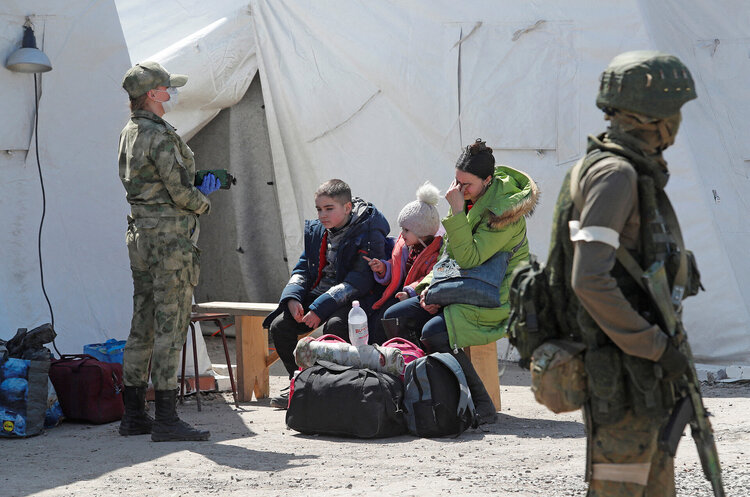Russians deport Ukrainian children to Russia to make money off them - The Guardian
Recently, the position of the Russian authorities has become tougher, and it is becoming increasingly difficult to return children

According to the Ukrainian government, more than 16,000 Ukrainian children have been deported to Russia since the beginning of the war. Some children are taken for financial gain, as the family that took them in receives federal and regional payments.
Source. The Guardian writes about it.
Many children were left without care because their parents were killed, for example, during the siege of Mariupol, separated from them because of the fighting or in Russian filtration camps. But there are also cases when children are taken by friends and even relatives for mercenary purposes – for money, The Guardian writes.
Svitlana Popova, who ended up in the occupied part of Kherson region with her 15-year-old daughter Alina, shared her story with the newspaper. A pro-Russian family friend, Yevhenia, entangled Alina in a web of lies, Svitlana said. She convinced the girl that when her family received food from Russian soldiers, they would be tortured and killed after the arrival of the Ukrainian army. And she suggested that they flee to Russia for "safety."
"I told Alina that it was all a lie, but she believed me, stole her birth certificate and left with Yevhenia shortly before the liberation of Kherson," Svitlana said. After tracking her daughter through social media posts, she found out that she ended up in a Russian village 1,500 kilometers from Ukraine. Svitlana contacted her via Viber messenger, but Yevheniia, upon learning of this, took the phone away from Alina.
"I was so scared," says Alina, "In Ukraine, Evgenia was so friendly, but she deceived me. When she found out that I had talked to my mother, she got angry and hit me. She was obsessed with money, with what she could get from the authorities for taking care of me.
The girl's mother traveled to Russia and filed an application with the guardianship and custody authority on the spot, claiming to be Alina's mother. But it turned out that Yevhenia had already filed documents for adoption, and in the meantime, she sent the girl 80 kilometers away to a "rehabilitation center."
"Strangely enough, the authorities were on my side," says Svitlana. "They were angry that she (Yevhenia) brought Alina to Russian territory. But they also told me that if I had arrived four days later, Alina would have already received a passport and become a Russian citizen, and then they would have been unable to do anything."
When a child is placed with a family, the adoptive parent, guardian, foster parent or adoptive guardian is entitled to a one-time federal payment of 20,472 rubles ($165). If you adopt a child with a disability over the age of 7, and even a child with a sibling, you can receive 156,428 rubles ($1250) for each.
In addition, there are monthly payments (depending on the category of children and foster families) and various social benefits and types of assistance. After obtaining citizenship, orphans, including those removed from Ukraine, are entitled to housing or subsidies for its purchase.
Regions can provide additional support. For example, in October 2022, the Moscow Regional Duma passed a law on monthly payments to foster parents who took in an orphan and a child left without parental care who "had to leave the territory" of Ukraine, the "DNR-LNR", Zaporizhzhia and Kherson regions. Depending on the age and health category of the child, the amount of payments ranges from 5394 to 19,140 rubles per month. In addition, there are additional payments for textbooks, recreation, etc.
According to the Ukrainian authorities, Russia has deported 16,226 people; the whereabouts of 10,513 have been established, and more than 300 have been returned to their homeland.
"We are most worried about those children who disappeared more than six months ago; during this time, the Russian authorities have been issuing them new birth certificates and passports and sending them to foster families," says Mykola Kuleba, a former Ukrainian Commissioner for Children's Rights who now heads Save Ukraine, an organization that helps parents like Svitlana find their children.
Payments for a child in Russia are made within 6 months from the date of the agreement on his or her adoption.
According to Kuleba, he is also aware of cases of children being used to receive payments: "One boy we rescued from a Russian school told us that there was another boy from Mariupol with him, who was given to a very poor family of alcoholics. He was not looked after, he was hungry every day. This suggests to me that they took him for money, so that they could buy alcohol."
Recently, the position of the Russian authorities has become tougher, and it is becoming more difficult to return children, especially if they have already been placed in foster care, Kuleba says: "They realize that each such case is a war crime, and they are trying harder and harder to prevent the return."
Background. As a reminder, the European Union plans to impose sanctions against 23 Russians for abducting children from Ukraine to Russia.
If you have read this article to the end, we hope that means it was useful for you.
We work to ensure that our journalistic and analytical work is of high quality, and we strive to perform it as competently as possible. This also requires financial independence. Support us for only UAH 196 per month.
Become a Mind subscriber for just USD 5 per month and support the development of independent business journalism!
You can unsubscribe at any time in your LIQPAY account or by sending us an email: [email protected]



